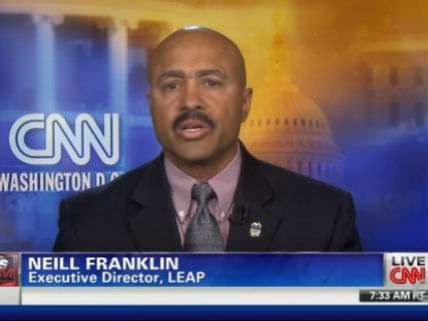Reactions to DOJ Marijuana Memo: Dismay, Exuberance, Skepticism

The Justice Department's newly announced policy regarding marijuana legalization in Colorado and Washington must be pretty good, because Kevin Sabet, the former Office of National Drug Control Policy staffer who heads the prohibitionist group Smart Approaches to Marijuana, hates it:
This is disappointing, but it is only the first chapter in the long story about marijuana legalization in the US. In many ways, this will quicken the realization among people that more marijuana is never good for any community, which is what happened after the Ogden memo [recommending prosecutorial restraint in cases involving people who comply with medical marijuana laws] was issued in 2009.
Here are some more-favorable reactions, in decreasing order of exuberance.
Neill Franklin, executive director of Law Enforcement Against Prohibition:
This is the most heartening news to come out of Washington in a long, long time. The federal government is not simply standing aside and allowing the will of the people to prevail in these two states. The attorney general and the Obama administration are exhibiting inspired leadership. The message to the people of the other 48 states, to all who value personal freedom and responsible regulation is clear: seize the day.
Anthony Johnson, executive director of Portland-based New Approach Oregon, which is trying to get a legalization measure on that state's ballot:
I'm very excited about it. If it holds true, it's a historic step for the federal government and the cannabis law reform movement.
Ethan Nadelmann, executive director of the Drug Policy Alliance:
Today's announcement demonstrates the sort of political vision and foresight from the White House we've been seeking for a long time. I must admit, I was expecting a yellow light from the White House. But this light looks a lot more green-ish than I had hoped. The White House is basically saying to Washington and Colorado: Proceed with caution.
Ezekiel Edwards, director of the American Civil Liberties Union's Criminal Law Reform Project:
We support the attorney general's decision not to interfere with individuals and entities that are complying with state marijuana laws, thereby respecting states' voter-approved and common-sense approaches to regulating marijuana. As the DOJ guidance makes clear, if states and local governments that have enacted laws legalizing marijuana create strong and effective regulatory systems, the federal government will defer to them to enforce those systems. It is incumbent on the DOJ to monitor implementation of its non-interference policy to ensure that U.S. attorneys' decisions are aligned with DOJ objectives, including that prosecutors should not consider the size or commercial nature of a marijuana operation dispositive in determining whether there is federal enforcement interest.
Tom Angell, chairman of Marijuana Majority:
It's nice to hear that the Obama administration doesn't at this point intend to file a lawsuit to overturn the will of the voters in states that have opted to modernize their marijuana policies, but it remains to be seen how individual U.S. attorneys will interpret the new guidance and whether they will continue their efforts to close down marijuana businesses that are operating in accordance with state law.
It's significant that U.S. attorneys will no longer be able to use the size or profitability of a legal marijuana business to determine whether or not it should be a target for prosecution, but the guidelines seem to leave some leeway for the feds to continue making it hard for state-legal marijuana providers to do business.
The administration's statement that it doesn't think busting individual users should be a priority remains meaningless, as it has never been a federal focus to go after people just for using small amounts of marijuana. The real question is whether the president will call off his federal agencies that have been on the attack and finally let legal marijuana businesses operate without harassment, or if he wants the DEA and prosecutors to keep intervening as they have throughout his presidency and thus continue forcing users to buy marijuana on the illegal market where much of the profits go to violent drug cartels and gangs.
In all, today's announcement represents a step in a right direction and a recognition by the administration that the politics of marijuana are rapidly shifting in favor of those who support legalization. However, my optimism is tempered by the fact that despite the Justice Department's 2009 announcement that it shouldn't be a priority to bust medical marijuana providers operating in accordance with state law, this administration went on to close down more state-legal marijuana businesses in one term than the Bush administration did in two terms.
As often seems to be the case, Angell's view is closest to mine.


Show Comments (16)